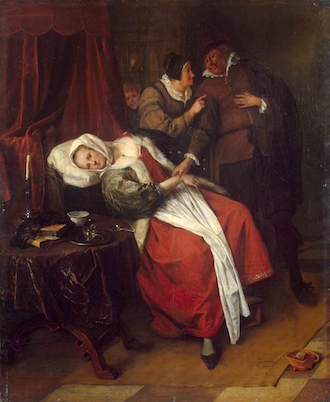A doctor’s visit, Anton Chekhov (1898)
‘I have palpitations of the heart’ she said, ‘It was so awful all night….I almost died of fright! Do give me something.’
‘I will, I will; don’t worry yourself.’
Korolyov examined her and shrugged his shoulders.
‘The heart is all right’, he said; ‘it’s all going on satisfactorily; everything is in good order. Your nerves must have been playing pranks a little, but that’s so common. The attack is over by now, one must suppose; lie down and go to sleep.’
At that moment a lamp was brought into the bedroom. The patient screwed up her eyes at the light, then suddenly put her hands to her head and broke into sobs. And the impression of a destitute, ugly creature vanished, and Korolyov no longer noticed the little eyes or the heavy development of the lower part of the face. He saw a soft, suffering expression which was intelligent and touching: she seemed to him altogether graceful, feminine, and simple;’
Extract from A doctor’s visit, Anton Chekhov (1898), translated by Constance Garnett. Full story linked below (it’s short).
Commentary
A well-to-do young woman, heiress to a prosperous factory, suffers from anxiety that presents as palpitations. The professor is summoned, but sends his young assistant Korolyov. The doctor finds nothing wrong, but is persuaded to stay overnight, and learns that there is more to the situation than meets the eye.
Initially Korolyov dislikes all that he finds: the family, the patient, the paintings, the factories, the workers, the place. He resents being summoned. But revisiting the patient late, and talking to her for apparently most of the night, he discovers that she is lonely, fearful, anxious. They discuss what the future holds. She is relieved. He leaves happier too. The story ends, leaving untold what came of each.
It is a commonplace that a patient presenting with minor symptoms often has deeper problems, and so it proves here. How quickly opinions of both patient and the doctor may change as each comes to understand the other. And how much it affects the outcome.
Anton Chekhov (1860-1904), revered Russian physician-writer, wrote the short story ‘A doctor’s visit’ in 1898. When Chekhov was in his late twenties, his father was declared bankrupt. He struggled to support himself and his family, who soon became crippled by poverty. One of many jobs he took to earn money was writing and selling some of his sketches – this marked the beginning of his literary career.
Chekhov was another medical writer who could not separate his medical and literary life. He once said “Medicine is my lawful wife, and literature is my mistress”. It couldn’t have been more true, as his passionate relationship with writing grew along with his medical career, although he considered Medicine to be his main profession.
More info
- Read the whole story, or any of 200 others (Eldritch Press, Creative Commons); or hear it read aloud – recommended (Librivox, Creative Commons, YouTube).
- Anton Chekhov – A brief biography (Britannica). He is a great figure of Russian literature, but his short stories stand out, and have been picked out repeatedly as transforming short story writing.
- Featured image – The Doctor’s Visit, Jan Steen, circa 1660 (Hermitage Museum, via Wikimedia). Steen painted many versions of this, often with hints to indicate the non-organic nature of the young woman’s complaint, such as the young lover visible through the window in the background in this version.
Contributed by
Lekaashree Rambabu
Rate this post

